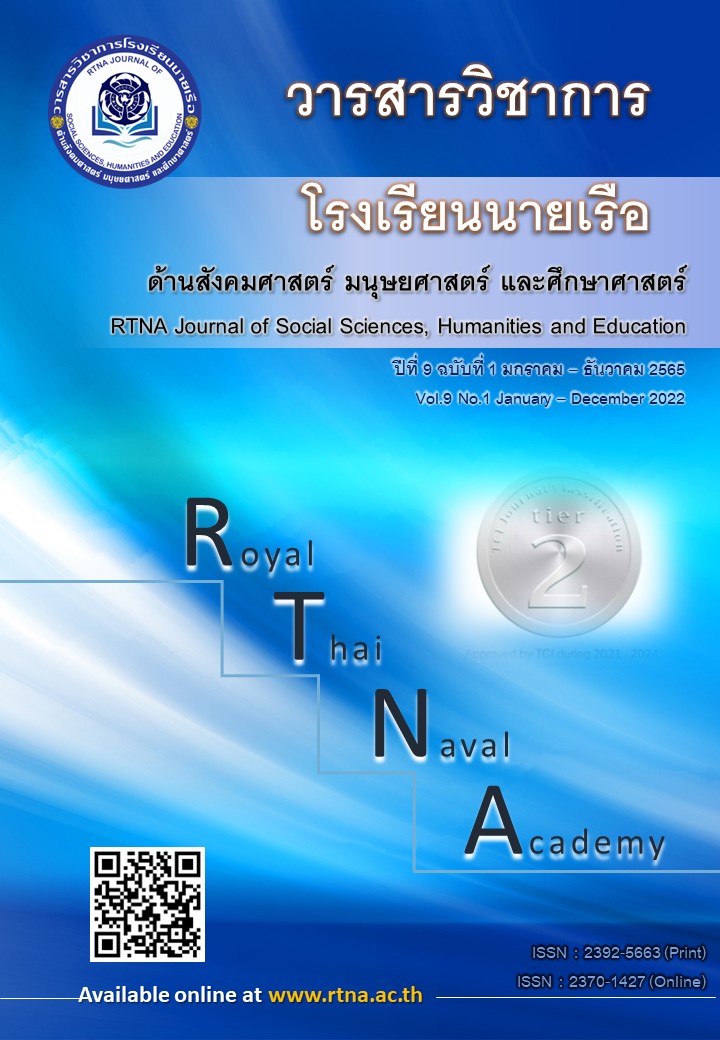ผลของการจัดการเรียนการสอนแบบผสมผสานโดยใช้ระบบการจัดการเรียนรู้และแอปพลิเคชัน เพื่อการศึกษาออนไลน์ที่มีต่อทักษะการเรียนรู้แบบนำตนเองและผลสัมฤทธิ์ทางการเรียนของนักเรียนนายร้อยชั้นปีที่ 4 วิชาจิตวิทยาการปกครองทางทหาร (PC 4103)
คำสำคัญ:
การจัดการเรียนการสอนแบบผสมผสาน, ทักษะการเรียนรู้แบบนำตนเอง, นักเรียนนายร้อยใหม่บทคัดย่อ
การวิจัยครั้งนี้มีวัตถุประสงค์เพื่อ 1) เปรียบเทียบทักษะการเรียนรู้แบบนำตนเองของนักเรียนนายร้อยก่อนและหลังการจัดการเรียนการสอนแบบผสมผสานโดยใช้ระบบการจัดการเรียนรู้และแอปพลิเคชัน
เพื่อการศึกษาออนไลน์ และ 2) เพื่อเปรียบเทียบผลสัมฤทธิ์ทางการเรียนของนักเรียนนายร้อยก่อนและหลังการจัดการเรียนการสอนแบบผสมผสานโดยใช้ระบบการจัดการเรียนรู้และแอปพลิเคชันเพื่อการศึกษาออนไลน์ตัวอย่างวิจัยคือ นักเรียนนายร้อยชั้นปีที่ 4 โรงเรียนพระจุลจอมเกล้า ปีการศึกษา 2564 จำนวน 180 คน ซึ่งได้มาจากการเลือกแบบเจาะจง (Purposive Sampling) เครื่องมือที่ใช้ในการวิจัย คือ แผนการจัดการเรียนการสอนแบบผสมผสานโดยใช้ระบบการจัดการเรียนรู้และแอปพลิเคชันเพื่อการศึกษาออนไลน์ มาตรวัดทักษะการเรียนรู้แบบนำตนเอง และแบบทดสอบความรู้ วิชาจิตวิทยาการปกครองทางทหาร (PC 4103) สถิติที่ใช้ในการวิเคราะห์ข้อมูล ได้แก่ สถิติเชิงพรรณนา (Descriptive Statistics) และการทดสอบค่าทีแบบไม่เป็นอิสระ (Dependent t-test) ผลการวิจัยพบว่า 1) หลังการทดลอง นักเรียนนายร้อยที่ได้รับการจัดการเรียนการสอนแบบผสมผสาน
โดยใช้ระบบการจัดการเรียนรู้และแอปพลิเคชันเพื่อการศึกษาออนไลน์มีทักษะการเรียนรู้แบบนำตนเองสูงขึ้นอย่างมีนัยสำคัญทางสถิติที่ระดับ .05 และ 2) หลังการทดลอง นักเรียนนายร้อยที่ได้รับการจัดการเรียนการสอนแบบผสมผสานโดยใช้ระบบการจัดการเรียนรู้และแอปพลิเคชันเพื่อการศึกษาออนไลน์มีผลสัมฤทธิ์ทางการเรียนสูงขึ้นอย่างมีนัยสำคัญทางสถิติที่ระดับ .05
เอกสารอ้างอิง
กรพรรณ ตันติเวชกุล, อาจณรงค์ มโนสุทธิฤทธิ์, และธนะวัฒน์ วรรณประภา. (2564). การพัฒนาบทเรียนแบบผสมผสานเพื่อพัฒนาทักษะการรับสาร สำหรับนักเรียนจ่าโรงเรียนชุมพลทหารเรือ.
วารสารวิชาการมนุษยศาสตร์และสังคมศาสตร์ โรงเรียนนายร้อยพระจุลจอมเกล้า, 8, 11-24.
กองทัพบก. (2559). คำสั่งกองทัพบกที่ 49/2559 เรื่อง นโยบายการศึกษาของกองทัพบก พ.ศ. 2560-2564. ลง 18 ตุลาคม 2559.
ชัยภัทร ศรีขจร. (2552). ผลของการจัดกิจกรรมการเรียนรู้แบบนำตนเองที่มีต่อผลสัมฤทธิ์ทางการเรียนสังคมศึกษาและความพึงพอใจต่อการเรียนรู้ของนักเรียนชั้นมัธยมศึกษาปีที่ 5 [ปริญญานิพนธ์ ค.ม. การสอนสังคมศึกษา]. กรุงเทพฯ: จุฬาลงกรณ์มหาวิทยาลัย.
ธีระดา ภิญโญ. (2555). เทคนิคการวิเคราะห์องค์ประกอบสำหรับงานวิจัย. นนทบุรี: เฟิร์นข้าหลวง พริ้นติ้ง แอนด์ พับลิชชิ่ง.
นงลักษณ์ วิรัชชัย. (2542). โมเดลลิสเรล: สถิติวิเคราะห์สำหรับการวิจัย. กรุงเทพฯ: จุฬาลงกรณ์มหาวิทยาลัย.
โรงเรียนนายร้อยพระจุลจอมเกล้า. (2563). หลักสูตรโรงเรียนนายร้อยพระจุลจอมเกล้า (หลักสูตรปรับปรุง พ.ศ. 2563). สืบค้นจาก http://kmlo.crma.ac.th/qaedu_crma/
โรงเรียนนายร้อยพระจุลจอมเกล้า. กรมนักเรียนนายร้อย รักษาพระองค์. (2564). คู่มือนักเรียนนายร้อย พ.ศ. 2564. กรุงเทพฯ: กรมนักเรียนนายร้อย รักษาพระองค์ โรงเรียนนายร้อยพระจุลจอมเกล้า.
โรงเรียนนายร้อยพระจุลจอมเกล้า. กองยุทธการและการข่าว. (2564). รายงานผลการตรวจเยี่ยมการประกันคุณภาพการศึกษา รร.จปร. ปีการศึกษา 2563. ลงวันที่ 25 มีนาคม พ.ศ.2564
ศิริชัย กาญจนวาสี. (2556). ทฤษฎีการทดสอบแบบดั้งเดิม. กรุงเทพฯ: โรงพิมพ์แห่งจุฬาลงกรณ์มหาวิทยาลัย.
Ayyildiz, Y., & Tarhan, L. (2015). Development of the self-directed learning skills scale. International Journal of Lifelong Education, 34(6), 663-679.
Banyen, W., Viriyavejakul, C., & Ratanaolarn, T. (2016). A Blended Learning Model for Learning Achievement Enhancement of Thai Undergraduate Students. International Journal of Emerging Technologies in Learning (iJET), 11(04), 48-55.
Draffan, E. A., & Rainger, P. (2006). A model for the identification of challenges to blended learning. ALT-J, 14(1), 55-67.
Evans, J.C., Yip, H., Chan, K., Armatas, C., & Tse, A. (2020). Blended learning in higher education: professional development in a Hong Kong university. Higher Education Research & Development, 39(4), 643-656. Garrison, D., & Kanuka, H. (2004). Blended Learning: Uncovering Its Transformative Potential in Higher Education. The Internet and Higher Education, 7, 95-105.
Golightly, A. (2018). The influence of an integrated PBL format on geography students’ perceptions of their self-directedness in learning. Journal of Geography in Higher Education, 42(3), 460–478.
Guglielmino, L. M. (1977). Development of the self-directed learning readiness scale [Doctoral dissertation], University of Georgia.
Hoic-Bozic, N., Mornar, V., & Boticki, I. (2009). A Blended Learning Approach to Course Design and Implementation. IEEE Transactions on Education, 52(1), 19-30.
Jones, N., Chew, E., Jones, C., & Lau, A. (2009). Over the worst or at the eye of the storm?. Education + Training, 51(1), 6-22.
Marriott, P., & Lau, A. (2008). The use of on-line summative assessment in an undergraduate financial accounting course. Journal of Accounting Education, 26(2), 73-90.
Osgerby, J. (2013). Students’ perceptions of the introduction of a blended learning environment: an exploratory case study. Accounting Education, 22(1), 85-99.
Sriarunrasmee, J., Techataweewan, W., & Mebusaya, R. P. (2015). Blended Learning Supporting Self-Directed Learning and Communication Skills of Srinakharinwirot University's First Year Students. Procedia - Social and Behavioral Sciences, 197, 1564-1569.
Uz, R., & Uzun, A. (2018). The Influence of Blended Learning Environment on Self-Regulated and Self-Directed Learning Skills of Learners. European Journal of Educational Research, 7(4), 877-886.
Wong, L., Tatnall, A., & Burgess, S. (2014). A framework for investigating blended learning effectiveness. Education + Training, 56(2/3), 233-251.
ดาวน์โหลด
เผยแพร่แล้ว
ฉบับ
ประเภทบทความ
สัญญาอนุญาต
ลิขสิทธิ์ (c) 2022 โรงเรียนนายเรือ

อนุญาตภายใต้เงื่อนไข Creative Commons Attribution-NonCommercial-NoDerivatives 4.0 International License.
เนื้อหาและข้อมูลในบทความที่ลงตีพิมพ์ในวารสารวิชาการโรงเรียนนายเรือ ด้านสังคมศาสตร์ มนุษยศาสตร์ และ ศึกษาศาสตร์ ถือเป็นข้อคิดเห็นและความรับผิดชอบของผู้เขียนบทความโดยตรง ซึ่งกองบรรณาธิการวารสาร ไม่จำเป็นต้องเห็นด้วย หรือร่วมรับผิดชอบใด ๆ
บทความ ข้อมูล เนื้อหา รูปภาพ ฯลฯ ที่ได้รับการตีพิมพ์ในวารสารวิชาการโรงเรียนนายเรือ ด้านสังคมศาสตร์ มนุษยศาสตร์ และ ศึกษาศาสตร์ ถือเป็นลิขสิทธิ์ของโรงเรียนนายเรือ หากบุคคลหรือหน่วยงานใดต้องการนำทั้งหมดหรือส่วนหนึ่งส่วนใดไปเผยแพร่ต่อหรือเพื่อกระทำการใด ๆ จะต้องได้รับอนุญาตเป็นลายลักษณ์อักษร จากโรงเรียนนายเรือก่อนเท่านั้น






